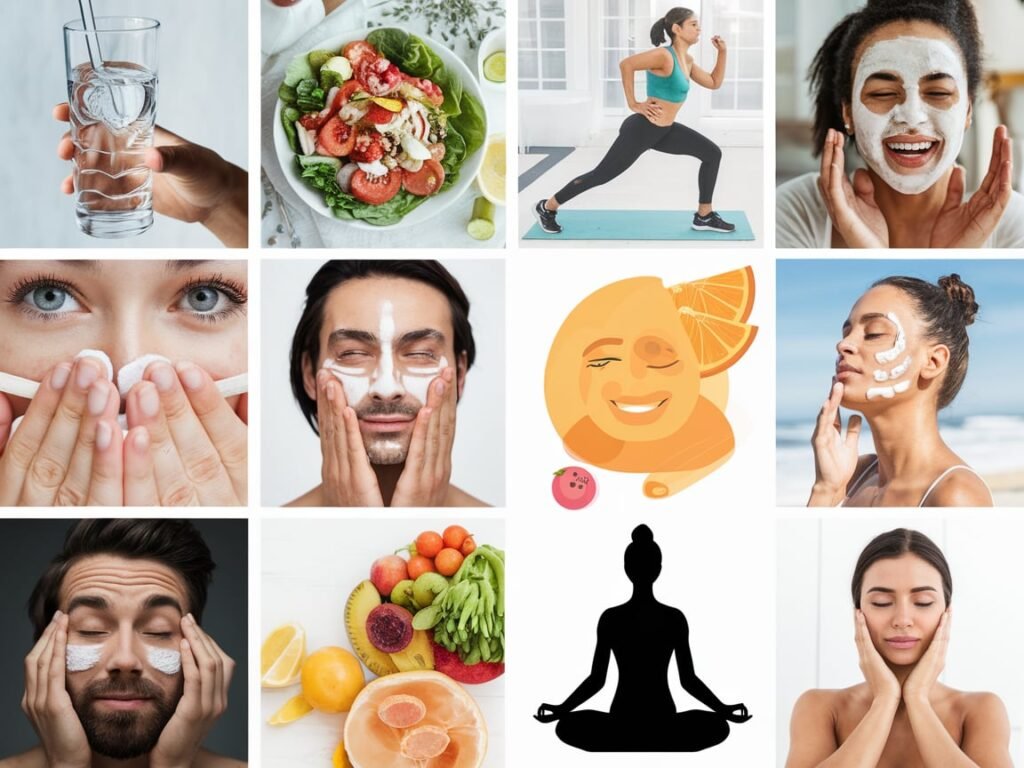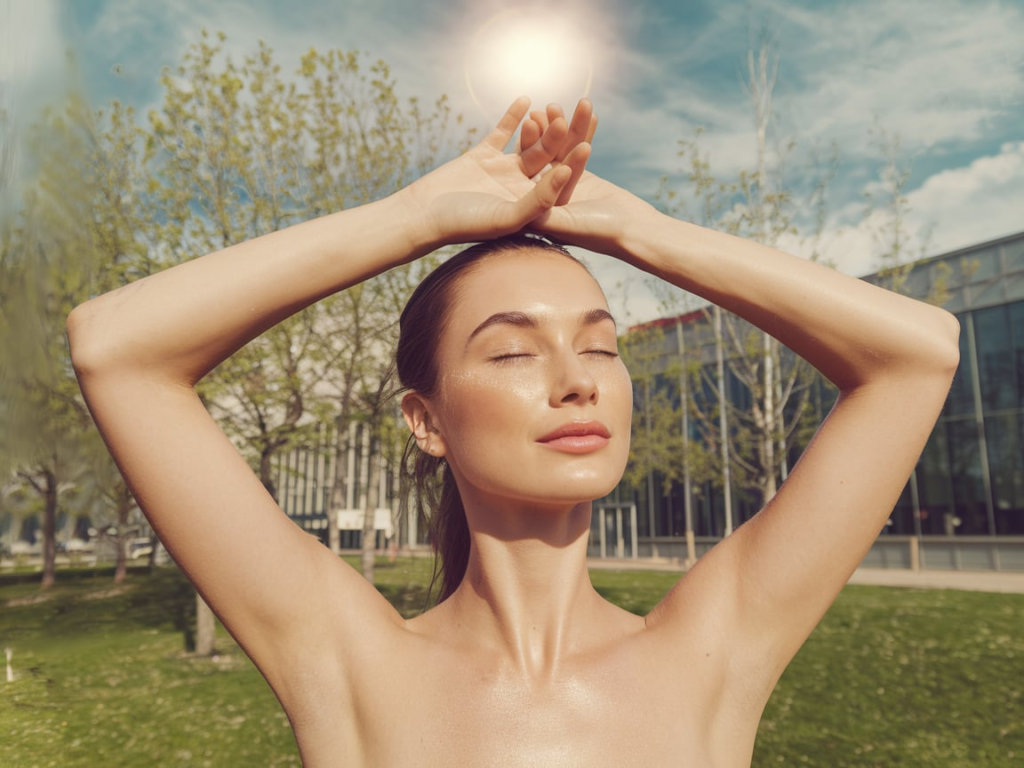
"Discover 10 simple yet effective lifestyle changes to improve your health and achieve glowing, youthful skin. From hydration and diet to exercise and sleep, these tips will help you glow from the inside out!"
Meta Description:
Learn 10 powerful lifestyle changes that can improve your overall health and give you glowing, youthful skin. Tips include hydration, diet, exercise, skincare habits, and more!
10 Lifestyle Changes for Better Health and Glowing Skin
Healthy skin doesn’t just rely on skincare products; it begins with a healthy lifestyle. The foods you eat, the water you drink, and even the way you sleep can have a significant impact on your complexion. Embracing small yet powerful lifestyle changes can help you achieve healthier skin and feel more vibrant overall.
In this article, we’ll explore 10 simple but effective lifestyle changes that will promote glowing skin and better health from the inside out.
1. Stay Hydrated for Healthier Skin
Water is essential for keeping your skin hydrated and youthful. When you’re hydrated, your skin looks plumper, smoother, and more radiant. Dehydration can lead to dryness, wrinkles, and dull skin, so it’s vital to drink plenty of water each day.
- Why it’s important: Hydration helps your skin retain moisture, reduces the appearance of fine lines, and boosts skin elasticity.
- How to do it: Aim for at least 8 cups (64 ounces) of water a day. You can also add hydrating foods like cucumber, watermelon, or citrus fruits to your diet.
Tip: Drinking water before meals can also help control appetite and keep your body hydrated throughout the day.
For more information on hydration benefits, check out Harvard Health’s guide.
2. Eat a Skin-Friendly Diet

Your skin reflects what you eat. A diet rich in essential vitamins, minerals, and antioxidants provides the nutrients your skin needs to stay clear, youthful, and glowing. Foods such as fruits, vegetables, nuts, and fatty fish can do wonders for your complexion.
- Key nutrients for glowing skin:
- Vitamin C (found in oranges, strawberries, and bell peppers) helps boost collagen production.
- Omega-3 fatty acids (found in salmon, walnuts, and flax seeds) maintain skin moisture and reduce inflammation.
- Antioxidants in berries and dark leafy greens protect the skin from free radical damage.
Tip: Aim to fill half of your plate with fruits and vegetables at every meal.
Learn more about the relationship between diet and skin health at The American Academy of Dermatology.
3. Get Moving: Exercise Regularly
Regular physical activity not only keeps your body fit but also benefits your skin. Exercise promotes healthy circulation, which helps deliver oxygen and nutrients to your skin cells, giving you a natural glow. Sweating also helps flush out toxins, reducing the risk of breakouts.
- How it helps: Increased blood flow enhances skin tone and clarity while reducing stress, a major factor in skin conditions like acne.
- How to do it: Aim for at least 30 minutes of moderate exercise such as walking, jogging, yoga, or swimming at least 5 days a week.
Tip: Don’t forget to wash your face after working out to remove sweat and prevent clogged pores.
For more information on how exercise benefits skin health, visit WebMD.
4. Prioritize Quality Sleep
Getting enough sleep is essential for skin repair. During deep sleep, your skin works to regenerate, repair cells, and produce collagen. Poor sleep can lead to tired, dull skin, and even increase the signs of aging.
- Why it’s important: Sleep reduces stress hormones, promotes collagen production, and boosts skin rejuvenation.
- How to do it: Aim for 7-9 hours of sleep each night. Keep your bedroom cool, dark, and quiet, and avoid screens before bedtime to promote deeper sleep.
Tip: Incorporate a relaxing bedtime routine, such as reading or meditation, to help you fall asleep more easily.
Explore more sleep tips at The National Sleep Foundation.
5. Stress Less for Clearer Skin

Chronic stress can wreak havoc on your skin. When you’re stressed, your body releases cortisol, a hormone that increases oil production and inflammation, leading to acne and other skin issues. Managing stress is key to maintaining clear, calm skin.
- How it helps: Lowering cortisol levels through stress management techniques prevents breakouts and other skin flare-ups.
- How to do it: Incorporate mindfulness practices like meditation, yoga, or deep breathing into your daily routine to reduce stress.
Tip: Regular physical activity is also a great stress reliever and can improve your skin’s appearance.
For more on stress and skin health, visit The American Psychological Association.
6. Develop a Consistent Skincare Routine

A proper skincare routine is essential to keeping your skin healthy. Regular cleansing removes dirt, oil, and makeup, while moisturizing locks in hydration. Sunscreen is a must to protect your skin from harmful UV rays.
- Essential Skincare Steps:
- Cleanse your face twice daily.
- Moisturize with a hydrating product that suits your skin type.
- Protect your skin with SPF 30 or higher, every day, even when indoors.
Tip: Invest in a gentle cleanser and avoid harsh scrubs, which can damage your skin’s natural barrier.
7. Avoid Smoking and Limit Alcohol Consumption
Both smoking and excessive alcohol consumption can damage your skin. Smoking reduces blood flow, leading to dull, saggy skin, while alcohol dehydrates the skin, causing it to look tired and aged.
- How it helps: Quitting smoking and cutting back on alcohol allows your skin to regain its natural radiance and prevents premature aging.
- How to do it: If you smoke, seek support to quit. Limit alcohol intake to moderate levels.
Tip: Drink a glass of water for every alcoholic drink to stay hydrated.
For more on quitting smoking and its benefits for your skin, visit Mayo Clinic.
8. Protect Your Skin from the Sun
The sun’s UV rays can cause irreversible damage to your skin, leading to wrinkles, age spots, and even skin cancer. Sun protection is essential for maintaining healthy, youthful skin.
- How it helps: Sunscreen prevents premature aging and protects against harmful UV rays.
- How to do it: Always apply sunscreen with SPF 30 or higher, even on cloudy days. Reapply every 2 hours if you’re outdoors.
Tip: Wear protective clothing and seek shade between 10 AM and 4 PM, when UV rays are the strongest.
Explore more on sun protection at The American Cancer Society.
9. Maintain a Healthy Weight
Maintaining a healthy weight benefits not only your overall health but also your skin. Rapid weight fluctuations can cause stretch marks and sagging skin. A balanced diet and regular exercise can help you achieve and maintain your ideal weight.
- How it helps: Stable weight prevents skin from stretching and sagging, keeping it smooth and firm.
- How to do it: Follow a healthy eating plan and stay active to maintain a healthy weight.
Tip: Focus on long-term lifestyle changes, rather than quick fixes or fad diets.
10. Detoxify Your Environment
The environment you live in affects your skin’s health. Pollutants, chemicals, and allergens can cause irritation, breakouts, and other skin issues. Detoxifying your home and work environment helps keep your skin clear and glowing.
- How it helps: Cleaner air and non-toxic environments reduce skin inflammation and irritation.
- How to do it: Use natural cleaning products, filter your water, and add plants to purify the air.
Tip: Avoid prolonged exposure to air pollutants by staying indoors on high pollution days.
Conclusion: Embrace a Healthier Lifestyle for Glowing Skin
Achieving healthy, glowing skin is about more than just skincare products—it’s about living a balanced, healthy lifestyle. Staying hydrated, eating nutritious foods, exercising, reducing stress, getting quality sleep, and protecting your skin from the sun can all contribute to radiant skin.
By making small but impactful lifestyle changes, you can improve your skin’s health and feel more confident in your natural beauty. Start implementing these changes today, and enjoy the benefits of glowing, youthful skin!
FAQs
Q1: How can I get glowing skin naturally?
A1: Glowing skin comes from a combination of hydration, a nutrient-rich diet, regular exercise, quality sleep, stress management, and proper skincare.
Q2: What foods should I eat for healthy skin?
A2: Foods rich in antioxidants, Vitamin C, Omega-3 fatty acids, and healthy fats, such as berries, fatty fish, nuts, and leafy greens, are great for skin health.
Q3: How much sleep is needed for healthy skin?
A3: Aim for 7-9 hours of sleep each night to allow your skin to repair, regenerate, and stay youthful.
Q4: Does exercise improve skin health?
A4: Yes, exercise increases blood flow, delivering oxygen and nutrients to your skin, which helps to improve skin tone and clarity.
Q5: How can I protect my skin from the sun?
A5: Always apply sunscreen with SPF 30 or higher, wear protective clothing,





